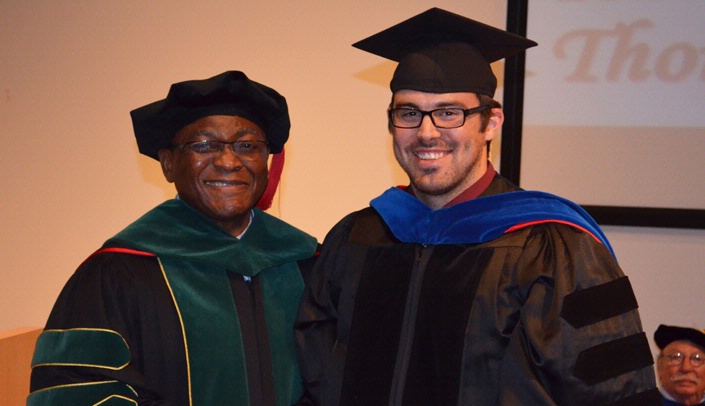James Reinecke, Ph.D., is the 2016 Thomas Jefferson Ingenuity Award recipient.
The award is given each cycle to a graduate student for their ingenuity in their doctoral research.
Dr. Reinecke, an M.D./Ph.D. student, worked in biochemistry and molecular biology with Steve Caplan, Ph.D. He is currently completing his medical degree.
“Midway through my undergraduate schooling, I found that I have a passion for biomedical research, for figuring out the things that are unknown,” he said.
As an undergraduate, Dr. Reinecke was working as a certified nurse’s assistant trainee, “to gain medical experience for applying to medical school,” he said. “The first patient that I had during my training was an ophthalmologist who had Alzheimer’s disease; he hardly recognized his family and had lost much of the intellect and cognitive function that had once enabled him to be a physician. I recall coming home every night and reading about the neurobiology, symptoms, diagnosis and treatment of Alzheimer’s.”
“I was struck by, despite how prevalent the Alzheimer’s is and how severe the symptoms are, we really had and still have a relatively poor understanding of the exact molecular mechanisms responsible for the pathogenesis of the disease. Current therapeutic options provide mild relief for symptoms but do not slow the progression of this debilitating disease.”
Returning to Central Michigan University the next fall, Dr. Reinecke found a researcher in the biology department who was using fruit flies to study the genetics and proteins involved in Alzheimer’s disease.
“My undergraduate research focused on trying to find genes that — at least in a fly — can prevent the neural degeneration that happens as a result of abnormal proteins that are expressed in neurons of patients with Alzheimer’s disease. Thus, from early on in my academic career, I treasured the opportunity to take observations made in the clinic — deficiencies, areas where we need more knowledge, where we need new treatments — and then bringing those observations into the lab to try to solve medical problems.”
Dr. Reinecke credited his Ph.D. advisor, Dr. Caplan, for encouraging his research.
“He has had a huge effect on my career and really made me very confident in making research a big part of my career going forward,” he said. “He provided enough guidance so that I never lacked direction during my Ph.D. thesis, but he also gave me the intellectual freedom to make my own hypotheses and test them. Steve creates an environment that provides students with every opportunity to succeed, as evidenced by the fact that I am Steve’s third graduate student to win this prestigious award.”
Dr. Reinecke also credited his undergraduate research advisor, Michelle Steinhilb, Ph.D., at Central Michigan.
“Michelle showed me very early on in my academic career how to do research, how to be passionate about research, and how to develop my own hypotheses. She provided me with intellectual freedom to develop projects that were outside of her immediate research interests.”
“Dr. Caplan and Dr. Steinhilb are the two most influential people in my research career thus far.”
As the end of his M.D. education looms, Dr. Reinecke will focus on clinical care in the immediate future. He will be applying to pediatric residencies this fall.
“In terms of actually doing bench research, residency will not be a great time to do that, as the focus should rightly be on learning how to diagnosis and treat patients,” he said.
“That being said, there are still ways to be involved in research without actually doing bench research. And the further you get along in your research career, it’s actually less about what you do at the bench and more about how you develop ideas, about spending a significant amount of time being immersed in the literature, figuring out what other investigators are doing and how you can add something novel to your field of interest.
“Even in a busy residency schedule, I think I can still keep reading scientific journals in my field of interest, I can keep going to research seminars at whatever campus I end up at for residency, and some residencies allow you protected research time — not a significant amount compared to a Ph.D., but enough so you can wet the whistle, so to speak.”
